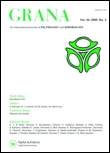
GRANA
Scope & Guideline
Illuminating the Pathways of Ecological and Botanical Research
Introduction
Aims and Scopes
- Palynological Research and Taxonomy:
The journal emphasizes the systematic study of pollen and spores to contribute to the taxonomy of various plant groups, providing insights into their morphological characteristics and evolutionary relationships. - Melissopalynology:
A significant area of focus is melissopalynology, which examines pollen found in honey, linking it to bee foraging behavior, honey quality, and the ecological implications of plant-pollinator interactions. - Pollen Analysis Techniques:
Research often explores advanced methodologies for pollen analysis, including innovative microscopy techniques and comparative studies of different analytical methods to improve accuracy and reliability. - Environmental and Ecological Studies:
The journal publishes studies investigating the ecological roles of pollen, including its seasonal variations, geographical distributions, and implications for climate change and environmental monitoring. - Palaeoecology and Historical Biogeography:
Another core area is the use of pollen data to reconstruct past vegetation and climate conditions, providing valuable insights into historical biogeographical changes.
Trending and Emerging
- Application of Advanced Microscopy Techniques:
There is a notable increase in the use of advanced microscopy techniques for pollen analysis, enhancing the detail and accuracy of morphological studies and contributing to the field's methodological advancements. - Impact of Climate Change on Pollen Dynamics:
Recent publications indicate a growing interest in understanding how climate change affects pollen production and dispersal, highlighting the ecological implications of these changes for plant and pollinator interactions. - Health and Allergy Studies:
Emerging themes include studies on pollen allergens and their impact on human health, particularly regarding respiratory allergies, indicating a bridging of palynology with public health research. - Integration of Pollen Databases:
The integration and enhancement of pollen databases for light microscopy and palynological research are trending, facilitating better data sharing and collaboration among researchers. - Focus on Regional Palynology:
An increasing trend towards region-specific palynological studies is evident, emphasizing localized ecological contexts and the unique contributions of various geographic areas to global palynological knowledge.
Declining or Waning
- Fossil Pollen Studies:
Research pertaining to fossil pollen and its geological contexts has decreased in frequency, suggesting a shift towards contemporary ecological studies and away from paleontological investigations. - Generalized Pollen Morphology Studies:
There appears to be a waning focus on broad surveys of pollen morphology that do not link to specific ecological or evolutionary contexts, as more targeted studies with clear implications for taxonomy and ecology are favored. - Urban Palynology:
While urban palynology has been a topic of interest, recent papers suggest a reduced emphasis on this area, possibly due to the greater focus on natural environments and their ecological dynamics.
Similar Journals
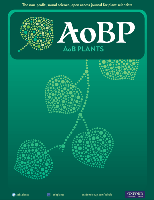
AoB Plants
Fostering collaboration in plant science research.AoB Plants is a distinguished open-access journal published by Oxford University Press, dedicated to advancing the field of plant science. Since its inception in 2009, this journal has played a pivotal role in disseminating high-quality research that encompasses a wide range of topics including plant biology, ecology, and biotechnology. With an impressive impact factor and a ranking in the Q1 quartile for Plant Science, AoB Plants is recognized for its innovative contributions and scholarly rigor, ranking #129 out of 516 in the Scopus Agricultural and Biological Sciences category, placing it in the 75th percentile among its peers. By promoting open-access availability of research findings, the journal empowers researchers and practitioners alike, facilitating greater collaboration and knowledge sharing in the global scientific community. Situated in the heart of the United Kingdom, AoB Plants continues its commitment to providing a platform for pioneering research and developments in plant science, thus fostering a deeper understanding of the crucial roles that plants play in our ecosystems and economies.
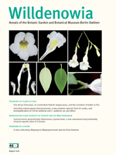
Willdenowia
Unlocking the secrets of plant evolution and behavior.Willdenowia is a prestigious scientific journal published by the Botanischer Garten & Botanische Museum Berlin-Dahlem, dedicated to advancing the field of botany and plant sciences. With an ISSN of 0511-9618, this journal has established itself as a crucial platform for researchers, practitioners, and students interested in ecology, evolution, behavior, systematics, and plant science. The journal boasts an impactful reputation, evidenced by its impressive Q1 and Q2 quartile rankings in Plant Science and Ecology, Evolution, Behavior and Systematics respectively, as well as notable Scopus rankings, placing it within the top quartiles of its categories. Although access is not open, articles published in Willdenowia contribute significantly to the global body of botanical research, making it an essential resource for anyone looking to deepen their understanding of plant biology and related ecological disciplines. The journal has continuously evolved since its inception and aims to facilitate interdisciplinary collaboration and knowledge dissemination in the life sciences.
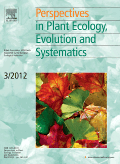
PERSPECTIVES IN PLANT ECOLOGY EVOLUTION AND SYSTEMATICS
Unveiling the Complexities of Plant Ecology and EvolutionPERSPECTIVES IN PLANT ECOLOGY, EVOLUTION AND SYSTEMATICS is a premier scientific journal published by Elsevier GmbH, dedicated to advancing knowledge and understanding in the fields of plant ecology, evolution, and systematics. With an impressive impact factor and a solid reputation within the top quartile (Q1) of both Ecology and Plant Science categories, this journal ranks among the elite, positioned 100th out of 721 journals in its field, reflecting its significant contribution to ongoing research and academic dialogue. Established in 1998 and converging through to 2024, this journal not only serves as a crucial platform for researchers, professionals, and students alike but also emphasizes innovative methodologies and interdisciplinary approaches to address pressing environmental issues. Although it follows a traditional access model, the wealth of rigorous peer-reviewed articles available will engage the scientific community and facilitate advancements in understanding plant diversity and ecological interactions.
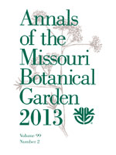
ANNALS OF THE MISSOURI BOTANICAL GARDEN
Championing Research for a Greener TomorrowANNALS OF THE MISSOURI BOTANICAL GARDEN is a prestigious, peer-reviewed journal published by the Missouri Botanical Garden, focusing on the rich disciplines of Ecology, Evolution, Behavior, and Plant Science. With a storied history dating back to 1946, this journal has evolved to become a significant platform for scholars and professionals to disseminate research that informs global understanding of plant biology and conservation. Ranked in the Q2 category for both Ecology and Plant Science in 2023, it boasts commendable standings within the Scopus rankings, placing it in the 66th percentile for Plant Science and the 65th percentile for Ecology, Evolution, Behavior, and Systematics. The journal's commitment to rigorous scientific standards ensures that it remains a vital resource for those seeking to explore vital ecological and botanical research. As a product of the esteemed Missouri Botanical Garden, the journal serves researchers, professionals, and students alike, encouraging collaboration and innovation in the plant sciences community.

KOREAN JOURNAL OF PLANT TAXONOMY
Cultivating collaboration in plant taxonomy research.Korean Journal of Plant Taxonomy, published by the Korean Society of Plant Taxonomists, serves as a pivotal platform for researchers and professionals in the fields of plant taxonomy and ecology. With an ISSN of 1225-8318 and a burgeoning E-ISSN of 2466-1546, this journal aims to disseminate high-quality research that contributes to our understanding of plant species diversity, classification, and evolution. Spanning the years from 2018 to 2024, the journal finds its niche within Q3 rankings in both Ecology, Evolution, Behavior and Systematics and Plant Science, reflecting its impactful contributions and relevance in the academic community. The journal's scope encompasses various studies aimed at advancing plant taxonomy in South Korea and globally. By fostering collaboration and sharing groundbreaking research, the Korean Journal of Plant Taxonomy plays a crucial role in shaping the discourse in plant sciences, making it an invaluable resource for students, researchers, and professionals alike, committed to advancing knowledge in this dynamic field.
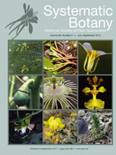
SYSTEMATIC BOTANY
Elevating Knowledge in Plant BiodiversitySystematic Botany, published by the American Society of Plant Taxonomists, is an esteemed journal focusing on the diverse fields of plant taxonomy, systematics, and evolution. With an ISSN of 0363-6445 and an E-ISSN of 1548-2324, this journal serves as a critical platform for researchers aiming to advance our understanding of plant biodiversity and evolutionary relationships. Operating since 1994, Systematic Botany has garnered significant recognition, achieving a Q2 ranking in Ecology, Evolution, Behavior and Systematics, and Plant Science categories, and ranking within the top half of Scopus for Genetics. The journal prioritizes publishing high-quality, peer-reviewed research, making it an essential resource for academics, practitioners, and students alike. Although it does not provide open access options, the journal's robust reputation in both American and international botanical research speaks to its pivotal role in disseminating vital scientific knowledge in the field. For those interested in the latest advancements in plant science, Systematic Botany is indispensable.
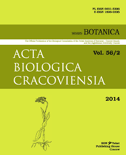
ACTA BIOLOGICA CRACOVIENSIA SERIES BOTANICA
Elevating botanical knowledge for a sustainable future.ACTA BIOLOGICA CRACOVIENSIA SERIES BOTANICA is a distinguished journal published by the Polska Akademia Nauk (Polish Academy of Sciences), with its roots tracing back to 1996. As a pivotal publication in the field of Plant Science, it serves to disseminate high-quality research and findings, contributing to the ongoing development and understanding of biodiversity, plant ecology, and conservation. The journal is indexed under Scopus, ranked #203 out of 516 in its category, placing it in the 60th percentile and firmly within Q3 quartile for Plant Science in 2023. Researchers, professionals, and students will find invaluable content within its pages, enhancing their knowledge and supporting academic exploration. Although it currently does not offer open access options, the journal remains a crucial resource for those engaged in botanical sciences, with a commitment to advancing scholarship in Poland and beyond.

AEROBIOLOGIA
Exploring the Invisible: Insights into Airborne BiologyAEROBIOLOGIA is an esteemed journal published by SPRINGER, dedicated to the dynamic fields of Immunology, Allergy, and Plant Science. With a history of scholarly contributions dating back to 1985, this journal serves as a critical platform for researchers and professionals to share advancements and findings in the understanding of airborne biological particles and their implications on health and biodiversity. As evidenced by its Q2 and Q3 quartile rankings in various categories as of 2023, AEROBIOLOGIA holds a significant position within the academic community, particularly in the realms of Agricultural and Biological Sciences. The journal encourages high-quality submissions and remains committed to fostering innovation and collaboration among scientists dedicated to the exploration of aerobiological phenomena. While it is not an open-access publication, its rich repository of research is crucial for academia and industry practitioners alike, facilitating essential insights into ecological interactions and immunological responses.
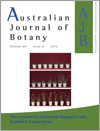
AUSTRALIAN JOURNAL OF BOTANY
Connecting researchers to the heart of plant biodiversity.The Australian Journal of Botany is a prestigious peer-reviewed journal published by CSIRO PUBLISHING, dedicated to advancing the field of plant sciences and ecology. Established in 1953, this journal provides a critical platform for researchers to share original research findings, reviews, and perspectives in subjects ranging from plant biology to ecological interactions, with a focus on Australian flora and its conservation. With an impressive impact factor and categorized in the Q3 quartile in both Ecology, Evolution, Behavior and Systematics and Plant Science, the journal ranks competitively within its fields, allowing authors to reach a diverse audience of professionals, students, and fellow researchers. The journal is accessible in print and electronically through its ISSN: 0067-1924 and E-ISSN: 1444-9862, providing wider access to vital research outcomes that influence environmental policies and natural resource management. As it aspires towards innovation and excellence, the Australian Journal of Botany remains an essential resource for those passionate about the richness of plant biodiversity and ecological understanding.

European Journal of Taxonomy
Exploring the dynamic world of species classification.The European Journal of Taxonomy is a distinguished open access journal, published by the MUSEUM NATL HISTOIRE NATURELLE in France, dedicated to the rich and dynamic field of taxonomy, ecology, and systematics. Since its inception in 2011, this journal has aimed to provide a platform for the dissemination of high-quality research and innovative methods relevant to the study of biodiversity and species classification. With a commendable Q2 ranking in the Ecology, Evolution, Behavior and Systematics category as of 2023, the journal ranks 380 out of 721 in Scopus, highlighting its pivotal role in advancing scientific knowledge in these essential areas. Researchers and students alike will find valuable resources and contributions that address pressing ecological and evolutionary questions from 2015 to 2024. By promoting open access, the European Journal of Taxonomy ensures that vital research is accessible to a broader audience, fostering collaboration and discourse among professionals striving to enhance our understanding of the natural world.